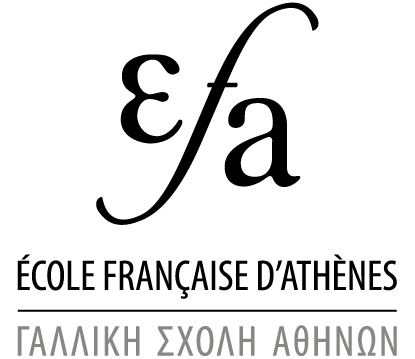Workshop “Unsung Pioneer Women in the Archaeology of Greece”
8 March 2023, École française d’Athènes
Organised by Sylviane Déderix, Maguelone Bastide and Priscilla Ralli (École française d’Athènes)
Deadline for submission: 20 January 2023
Submission and information: sylviane.dederix@efa.gr
Download the call for papers (pdf file)

In the late 20th century, the feminist historian of science Margaret W. Rossiter coined the term “Matilda Effect” to describe the historical process by which women’s scientific discoveries tend to be attributed to their male partners or colleagues [1]. The world of archaeology is certainly not immune to this systemic and persistent invisibilisation of women. As part of ongoing struggles against inequality and discrimination in our discipline [2], several projects aim at giving women their rightful place in the history of archaeology [3]. Following in the footsteps of such projects and, more generally, of recent works honouring women’s contributions to history, the arts and science [4], the École française d’Athènes will host, on the symbolic date of March 8, a one-day workshop dedicated to unsung women who have pioneered archaeology in Greece.
In spite of the obstacles that they faced to participate actively in excavations, to lead projects and to get academic appointments, women did contribute to the development of archaeology in Greece during the first decades of the 20th century. They worked on site, in storerooms, in museums and in classrooms, pursuing noteworthy archaeological careers. Yet, few of these women have attained wide recognition. Among the best known names are Anna Apostolaki (the first Greek woman to work as a professional archaeologist and the first woman to be admitted to the Archaeological Society of Athens [5]), Harriet Boyd Hawes (the first woman to direct an archaeological expedition in Greece [6]) and Semni Papaspyridi-Karouzou (the first woman appointed curator of antiquities by the Greek Archaeological Service, most renowned for her role in protecting the collections of the National Archaeological Museum in Athens during World War II [7]). Many others are commonly overlooked. Little is known of the women who worked in the shadow of their male spouses, mentors or colleagues and saw their work belittled, appropriated or blatantly plagiarized [8]. As to those who published their own research, they have generally fallen victim to the gender gap in citations, thus being commonly omitted in reviews and syntheses. It is these hidden figures that our workshop focuses on. By telling the work, the accomplishments and the legacy of under-recognized and unrecognized women archaeologists, we aim to bring their contribution into focus and help to write a more inclusive history of the archaeology of Greece.
We are welcoming proposals for biographic communications (15-20 minutes) focusing on an unsung pioneer woman archaeologist who conducted research in Greece or on the ancient Greek world. Abstracts (up to 500 words, in English) can be sent to sylviane.dederix@efa.gr until 20 January 2023. Following the workshop, a compendium of short biographies (ca. 2000 words each) will be published in the Bulletin de Correspondance Hellénique in the form of a collective article written jointly by all participants in the workshop.
References:
[1] Rossiter M.W., 1993. The
[2] E.g. the travelling exhibition Archéosexisme (https://archeoethique.wixsite.com/association/exposition-archeo-sexisme).
[3] E.g. Claassen C. (ed.), 1994. Women in Archaeology, University of Pennsylvania Press; Díaz-Andreu M. & Stig Sørensen M.L. (eds), 1998. Excavating Women. A History of Women in European Archaeology, Routledge; Cohen G.M. & Sharp Joukowski M. (eds), 2004. Breaking Ground: Pioneering Women Archaeologists, University of Michigan Press. See also Pacific Matildas (https://www.uwa.edu.au/projects/pacific-matildas-finding-the-women-in-the-history-of-pacific-archaeology); Trowelblazers (https://trowelblazers.com); Breaking Ground: Women in Old World Archaeology (https://www.brown.edu/Research/Breaking_Ground/search.php).
[4] Perrot M., 1998. Les femmes ou les silences de l’histoire, Flammarion; Rossiter M., Ogilvie M. & Harvey J., 2000. The Biographical Dictionary of Women in Science. Pioneering Lives from Ancient Times to the Mid-20th Century, Routledge; Watts E., 2007. Women in Science. A Social and Cultural History, Routledge; Des Jardins J., The Madame Curie Complex: The Hidden History of Women in Science, The Feminist Press; Collectif Georgette Sand, 2018. Ni vues ni connues. Panthéon, Histoire, mémoire : où sont les femmes ?, Hugo Document; Tietjen J.S., 2020. Scientific Women. Re-visioning Women’s Scientific Achievements and Impacts, Springer; Bagieu P., 2022. Culottées. Des femmes qui ne font que ce qu’elles veulent, Gallimard; Waquet F., 2022. Dans les coulisses de la science. Techniciens, petites mains et autres travailleurs invisibles, CNRS Éditions.
[5] Florou V. & Oikonomou A. (eds), 2017. Αντίδωρο για την Άννα Αποστολάκι: Η ζωή, το έργο και η συνεισφορά της, Λύκειον των Eλληνίδων.
[6] Allsebrook M., 2002. Born to Rebel: The Life of Harriet Boyd Hawes, Oxbow; Fotou V. & Brown A., 2004. Harriet Boyd Hawes (1871-1945). In: Cohen G.M. & Sharp Joukowski M. (eds), Breaking Ground: Pioneering Women Archaeologists, University of Michigan Press, p. 198-273.
[7] Nikolaidou M. & Kokkinidou D., Greek women in archaeology: An untold story. In: Díaz-Andreu M. & Stig Sørensen M.L. (eds), Excavating Women. A History of Women in European Archaeology, Routledge, p. 229‑258.
[8] Kaiser A., 205. Archaeology, Sexism, and Scandal: The Long-Suppressed Story of One Woman’s Discoveries and the Man Who Stole Credit for Them, Rowman & Littlefield.
